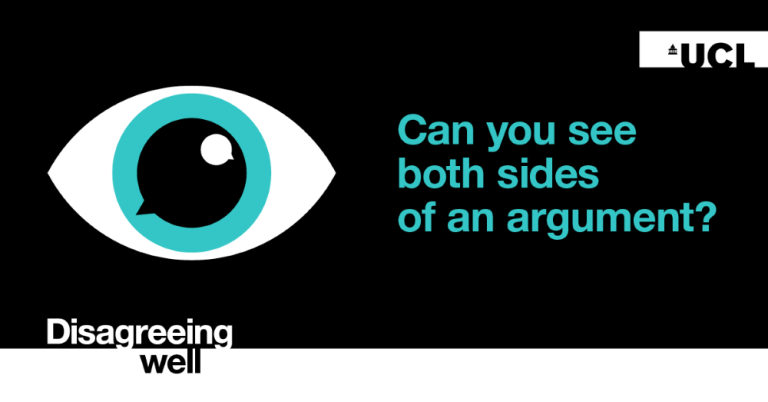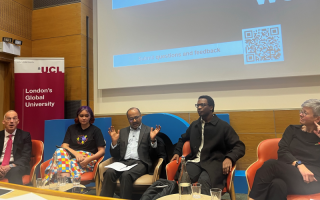Agree to disagree: are our lives really in black and white?
23 November 2023
VPEE Student Journalist, Giovanna Cantarin, shares her reflections of attending the first UCL Disagreeing Well event: Disagreeing Well in Higher Education.

"But whose side are you on?"
This is a question we have all heard ourselves asked at least once in our lives, perhaps not very long ago. Given the recent events, many of us will have tried to confront our friends and classmates in search of firm truth– to find common ground on divisive topics.
The incomprehensible, in fact, creates an inner conflict with our ancestral need for apparent clarity, for a human sense of belonging, for binary rationality, for a total lack of nuance.
And there is nothing wrong with this: seeking comfort in certainty is part of our human nature.
Yet, if right and wrong was so clean cut, there would be no discussions, let alone wars.
Reality is very different, full of contrasts and nuances: a massive chiaroscuro, and there are no simple answers to complex issues.
“The role of universities as a forum for open discourse in an increasingly polarized world”
On 9 November, I attended an interactive event chaired by the Chief Executive of the British Academy, Hetan Shah,at the Darwin Lecture Theatre. The theme "Disagreeing Well in Higher Education" was discussed by a brilliant panel consisting of our Union Affairs Officer at the Students' Union, Mary McHarg, and our President and Provost, Michael Spence, along with Professor Sasha Roseneil, Vice-Chancellor and President of the University of Sussex, and Tomiwa Owolade, journalist, author and UCL alumni.
The "Disagreeing Well" campaign was launched externally by UCL this autumn with the goal of addressing the role of universities as a forum for open discourse in an increasingly polarized world, because, while it is true that censorship cuts off and sets limits, culture broadens and creates horizons.
In this hour and a quarter, there was a lot of talk about several issues, and yet, what emerged in the end were not answers but only questions.
"The consequence of living in a free society"
Disagreement, as stated by Owolade during the event, is the inevitable “consequence of living in a free society.”
However, dissent can take different forms. There is a healthy disagreement, which recognises in the ‘other’ a person like us, and a depersonalising disagreement, which objectifies and belittles. While the first creates space for growth and personal development, the latter often results in hateful acts.
The difference between disagreeing well and shouting at each other is, I believe, in maintaining mutual respect.
We have seen it on a large scale in Sudan, Israel and Palestine, Artsakh and Azerbaijan, and Ukraine and Russia, to name a few. On a smaller scale, we are seeing it here at UCL with the recent Islamophobic and anti-Semitic attacks: one dimension reflects the other.
As Professor Roseneil said, "universities are not ivory towers, but crystallisations and intensifications of the social, cultural, and political forces that are shaping the rest of society", and UCL is not exempt from this definition.

The ‘University College London Equality, Diversity and Inclusion Data Report 2018-2022’ shows how intrinsically pluralistic our community is. Here in UCL, we come from diverse families, and we are equally dissimilar in terms of age, gender, ethnicity, economic background, or beliefs. Therefore, what is at risk in our community is not diversity, but confrontation. And yet, the question is: “how do you get people to live together across lines of such a profound diversity?”
Those who have different ideas from the strongest voice, which is not necessarily the voice of majority, may be shunned and marginalised in the name of political correctness. This new Zeitgeist of our time only admits a black and a white, a right and a wrong, and moves everything to the level of a kitsch idealism that leads nowhere.
Looking at the world with Manichaeism, with the tendency to rigidly and dogmatically oppose every idea and principle, creates an alarming polarisation. Allowing for a whole spectrum of opinions between opposing views of a debate has always been the most fertile ground for enriching exchanges. Putting people into opposing boxes at extreme positions with nothing in between can be as limiting as well as dangerous. It is difficult to move in absolute black and white.
So what can we do?
Here at UCL, the Students' Union actively promotes freedom of speech, working towards fostering inclusive debates on a wide array of topics. As highlighted by our Union Affairs Officer, more than 1,500 guest speakers spanning the entire political spectrum visit campus each year invited by our student groups. Therefore, to support healthy disagreement, initiatives like the Impartial Chair Programme are in place to ensure that discussions are always welcoming to diverse perspectives.
But Impartial Chairs will not be present in every moment of our lives. During any discussion, I believe it is crucial to bear in mind the three golden rules given by the UCL Provost:
Listen, and actually do it. Listening to appreciate and understand another point of view, without thinking about what we are going to say next.
A set of virtues around communication: using a language that is not reductive and that does not cut short the ‘other.’
Epistemic humility: accepting that we can be wrong and asking ourselves why other reasonable human beings think what they think.
Spence explained that the alternative to disagreeing well is that either we start shouting at one another or that we self-censor and simply don't talk.
Friction creates things; from nothing, nothing is born. Perhaps, rather than political correctness, we should educate, and educate ourselves, to respect. Because if with the first we can only monologue, it is with the latter that we dialogue.
Indeed, I believe every situation has many sides; often, the difficult thing is to see them all.
“The danger of acronyms”
I think that there is another rule to add to this list and that is: leaving assumptions behind.
In his first intervention, Owolade pointed out how “we don’t speak about diversity with enough diversity.”
People in a minoritised community, and I would argue in any community, don’t necessarily share the same views on any given issue. There are “differences within differences”. We should not assume the views of a group of people on the basis of identity, if we want to encourage a culture of disagreeing well.
This is where what Owolade called “the danger of acronyms” comes into play.
We love using acronyms, but we usually overlook how they only give us a very small idea of the people who fall under that definition. Acronyms are simplifications and, as such, they often fail to capture the nuanced richness of who or what they represent.
Now, let us be honest, none of us can remember the meaning of every acronym we have heard.
All these abbreviations and oversimplifications tend to result in a jungle of jargon that can be a potential barrier for people to learn and educate themselves.
Furthermore, why are we assuming that other people cannot relate to a certain set of feelings and experiences?
This labelling and dividing are at the root of intolerance and disrespect in any sphere of life, not only in higher education. Probably, as Owolade suggests, the only way out this vicious circle is really to understand that we have a “shared fundamental humanity.”
About this, you can disagree with me, but on the need for respect, I think we can all agree.
Find out more
To watch the recording of the event and access news and resources, visit the Disagreeing Well website.
About the author
I'm Giovanna, and I am currently navigating my first year as an undergraduate in the Experimental Linguistics program. My passion lies in amplifying the voices that often go unheard, as well as sowing the seeds of curiosity. As a Student Journalist, I hope to hone my outreach skills and contribute my part to the vibrant UCL community, sparking a ripple of positive change, however small it may be.

 Close
Close

